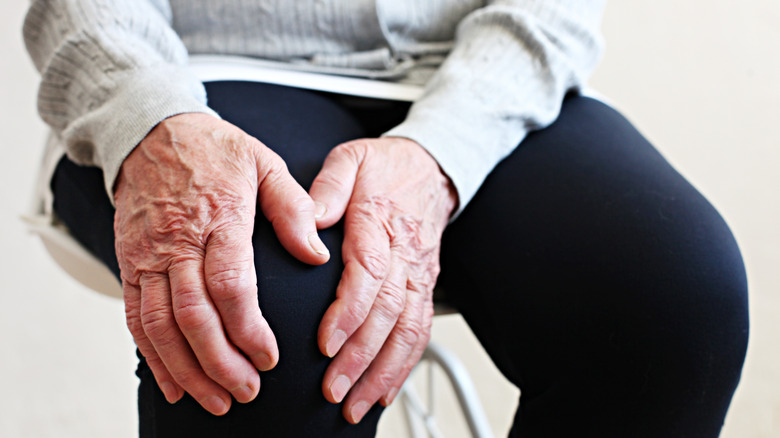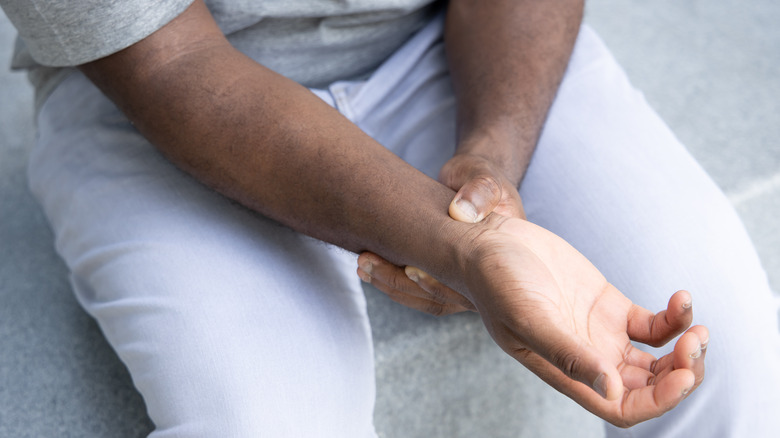What Causes Your Joints To Be Hot To The Touch?
Our body undergoes numerous physical changes as we grow older, and our joints are no exception to the rule. According to the American Academy of Orthopaedic Surgeons, as we age, our joints' range of motion becomes more limited and flexibility is reduced. Similarly, while joints that feel hot to the touch can be the result of age-related conditions, there are also causes of warm joints that can affect anyone of any age.
For example, experts at MedicineNet point out that joints that feel warm upon contact may be caused by physical trauma, such as knee strain, a torn meniscus, ACL injury, stress fracture, dislocated knee, and more, as all of these conditions prompt inflammation in the joints. Alternatively, it's not uncommon to experience warmth during recovery following joint surgery.
Even more simply, the use of a heating pad could be what's making your joints feel hot to the touch. However, there are cases in which joint warmth may not be related to external factors, but may instead be due to infection or an underlying health condition.
Health conditions that may lead your joints to feel hot
In some cases, a viral or bacterial infection, such as Lyme disease, may be responsible for joints that feel warm to the touch (via Healthline). To determine whether or not infection is the cause, a physician may analyze the joint's surrounding synovial fluid.
Alternatively, those with certain health conditions may find their joints feel warm upon contact. This can include bursitis, a condition characterized by swelling of the fluid-filled bursa sacs around the knee. In addition, sickle cell disease has also been linked with joint warmth — a condition that affects the health of red blood cells.
Most frequently, however, a joint that feels hot when touched is an indicator of rheumatoid arthritis (RA) or osteoarthritis (OA). In cases of rheumatoid arthritis, the immune system targets the cells in our joints. For patients with RA, symptoms are often experienced in the hands and wrists. Conversely, osteoarthritis is the result of progressive wear and tear on the cushioning that pads our joints. The pain, inflammation, and warmth that can accompany the condition are often felt in the joints of the hips, lower back, and knees. Warm joints can also be a sign of psoriatic arthritis (PsA), according to MedicineNet.
Treatments for joints that feel hot to the touch
Depending on the cause of your warm joints, there may be different treatment options available. In some cases, medication may be appropriate if the cause is due to a health condition. Other people may require steroid injections if the cause is related to inflammation (via Healthline). Alternatively, surgery may be warranted if one is in need of a new joint entirely.
Furthermore, if the cause for your warm joints is due to psoriatic arthritis, light therapy may potentially be a viable treatment option for patients, according to the Arthritis Foundation. There is also some evidence to suggest that light therapy may be effective for cases of osteoarthritis. A 2013 animal study published in Arthritis Research & Therapy saw decreases in inflammatory cells in rats who were treated with low-level laser light therapy to their knee joints. However, more research is currently needed on the subject.
There are also at-home treatment remedies for warm joints your doctor may recommend. These include applying either a hot or cold compress to the affected area, using non-steroidal anti-inflammatory medications such as ibuprofen, and getting plenty of rest. Additionally, low-intensity activities such as swimming or walking may help relieve the discomfort of warm joints.



